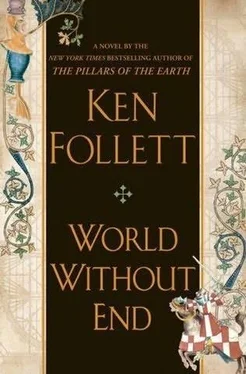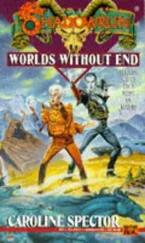The younger man held on to Gwenda and Pa while the leader pulled the bodies of their comrades out from under the bush.
“That Thomas must be a rare fighter, to kill Harry and Alfred together,” the older man mused, looking at the corpses. Gwenda realized that these men did not know about the other children. She would have confessed that she had not been alone, and that Ralph had killed one of the men, but she was too terrified to speak. “He’s nearly cut Alfred’s head off,” the man went on. He turned and looked at Gwenda. “Was anything said about a letter?”
“I don’t know!” she said, finding her voice. “I had my eyes shut because I was frightened, and I couldn’t hear what they were saying! It’s true, I’d tell you if I knew!”
“If they got the letter from him in the first place, he would have taken it back after he killed them anyway,” the man said to his comrade. He looked at the trees around the clearing, as if the letter might have been hanging among the dying leaves. “He probably has it now, at the priory where we can’t get at him without violating the sanctity of the monastery.”
The second man said: “At least we can report exactly what happened and take the bodies home for a Christian burial.”
There was a sudden commotion. Pa wrenched himself out of the grasp of the second man and dashed across the clearing. His captor moved to go after him, but was stopped by the older man-at-arms. “Let him go – what’s the point in killing him now?”
Gwenda began to cry quietly.
“What about this child?” said the younger man.
They were going to murder her, Gwenda felt sure. She could see nothing through her tears, and she was sobbing too hard to plead for her life. She would die and go to hell. She waited for the end.
“Let her go,” said the older man. “I wasn’t born to kill little girls.”
The younger man released her and gave her a shove. She stumbled and fell to the ground. She got up, wiped her eyes so that she could see, and stumbled off.
“Go on, run away,” the man called after her. “It’s your lucky day!”
*
Caris could not sleep. She got up from her bed and went into Mama’s room. Papa was sitting on a stool, staring at the still figure in the bed.
Mama’s eyes were closed and her face glistened, in the candlelight, with a film of perspiration. She seemed to be hardly breathing. Caris took her pale hand: it was terribly cold. She held it between her own, trying to warm it.
She said: “Why did they take her blood?”
“They think illness sometimes comes from an excess of one of the humours. They hope to take it away with the blood.”
“But it didn’t make her better.”
“No. In fact, she seems worse.”
Tears came to Caris’s eyes. “Why did you let them do it, then?”
“Priests and monks study the works of the ancient philosophers. They know more than we do.”
“I don’t believe that.”
“It’s hard to know what to believe, little buttercup.”
“If I was a doctor, I’d only do things that made people better.”
Papa was not listening. He was looking more intently at Mama. He leaned forward and slipped his hand under the blanket to touch her chest just below her left breast. Caris could see the shape of his big hand under the fine wool. He made a small choking sound in his throat, then moved his hand and pressed down more firmly. He held it there for a few moments.
He closed his eyes.
He seemed to fall slowly forward, until he was on his knees beside the bed, as if praying, with his big forehead resting on Mama’s thigh, and his hand still on her chest.
She realized he was crying. It was the most frightening thing that had ever happened to her, much more frightening than seeing a man killed in the forest. Children cried, women cried, weak and helpless people cried, but Papa never cried. She felt as if the world was ending.
She had to get help. She let Mama’s cold hand slip out of her own on to the blanket, where it lay motionless. She went back to her bedroom and shook the shoulder of the sleeping Alice. “You’ve got to wake up!” she said.
At first Alice would not open her eyes.
“Papa is crying!” Caris said.
Alice sat upright. “He can’t be,” she said.
“Get up!”
Alice got out of bed. Caris took her older sister’s hand and they went together into Mama’s room. Papa was standing up, now, looking down at the still face on the pillow, his face wet with tears. Alice stared at him in shock. Caris whispered: “I told you so.”
On the other side of the bed stood Aunt Petranilla.
Papa saw the girls standing in the doorway. He left his station by the bed and came to them. He put one arm around each of them, drew them both to him, and hugged them. “Your Mama has gone to be with the angels,” he said quietly. “Pray for her soul.”
“Be brave, girls,” said Petranilla. “From now on, I will be your mama.”
Caris wiped the tears from her eyes and looked up at her aunt. “Oh, no, you won’t,” she said.
Part Two. 8 to 14 June, 1337
On Whit Sunday in the year that Merthin was twenty-one, a river of rain fell on Kingsbridge Cathedral.
Great globules of water bounced off the slate roof; streams flooded the gutters; fountains gushed from the mouths of gargoyles; sheets of water unfolded down the buttresses; and torrents ran over the arches and down the columns, soaking the statues of the saints. The sky, the great church and the town round about were all shades of wet grey-paint.
Whit Sunday commemorated the moment when the Holy Spirit descended on the disciples of Jesus. The seventh Sunday after Easter, it fell in May or June, soon after most of England’s sheep had been sheared; and so it was always the first day of the Kingsbridge Fleece Fair.
As Merthin splashed through the downpour to the cathedral for the morning service, pulling his hood forward over his brow in a vain attempt to keep his face dry, he had to pass through the fair. On the broad green to the west of the church, hundreds of traders had set out their stalls – then hastily covered them with sheets of oiled sacking or felted cloth to keep the rain off. Wool traders were the key figures in the fair, from the small operators who collected the produce of a few scattered villagers, to the big dealers such as Edmund who had a warehouse full of woolsacks to sell. Around them clustered subsidiary stalls selling just about everything else money could buy: sweet wine from the Rhineland, silk brocade threaded with gold from Lucca, glass bowls from Venice, ginger and pepper from places in the East that few people could even name. And finally there were the workaday tradespeople who supplied visitors and stallholders with their commonplace needs: bakers, brewers, confectioners, fortune-tellers and prostitutes.
The stallholders responded bravely to the rain, joking with one another, trying to create the carnival atmosphere; but the weather would be bad for their profits. Some people had to do business, rain or shine: Italian and Flemish buyers needed soft English wool for thousands of busy looms in Florence and Bruges. But more casual customers would stay at home: a knight’s wife would decide she could manage without nutmeg and cinnamon; a prosperous peasant would make his old coat last another winter; a lawyer would judge that his mistress did not really need a gold bangle.
Merthin was not going to buy anything. He had no money. He was an unpaid apprentice, living with his master, Elfric Builder. He was fed at the family table, he slept on the kitchen floor, and he wore Elfric’s cast-off clothes, but he got no wages. In the long winter evenings he carved ingenious toys that he sold for a few pennies – a jewel box with secret compartments, a cockerel whose tongue poked out when its tail was pressed – but in summer there was no spare time, for craftsmen worked until dark.
Читать дальше












